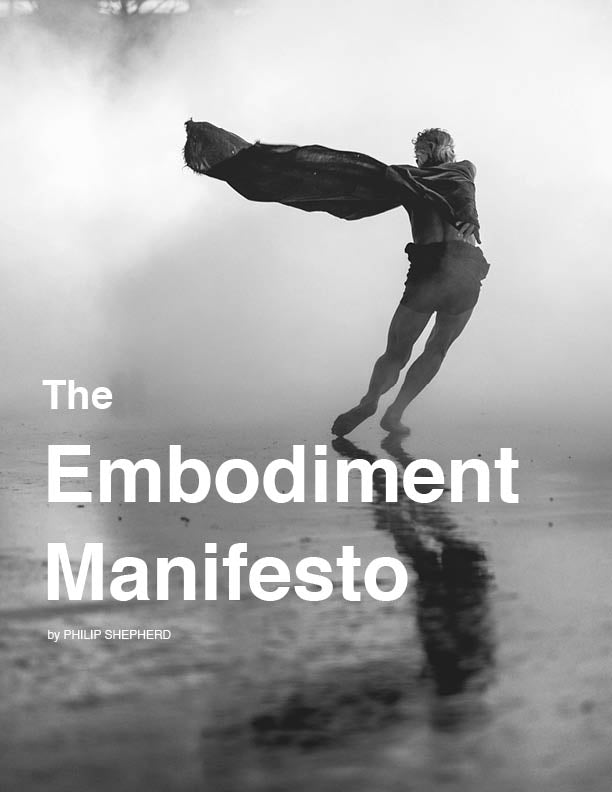The Blind Spot We Harbor, the Revolution to Come
I believe that humanity can survive the crises that are mounting around us – but that our ability to make it will depend on us forging a new kind of clarity.
Specifically, we need to shed light on the story we tell ourselves about what it means to be human. It’s a story almost too familiar to question, yet it provokes fantasies of limitless growth and power, and puts us on a collision course with the realities of our world.
I believe this story is the single greatest danger to our survival.
I also believe that the single most dangerous effect of this story is the way it estranges us from our own bodies, and makes that feel normal.

Introduction
It is clear to most people that the way we are living is not sustainable. It is clear in the damage we are inflicting on the ecosystem on which we rely; in the cataclysmic rate of species extinction; in the pressures of a growing human population on the earth’s finite resources; and even in the stress we carry in our bodies day in, day out. We try to lessen our impact by changing our behavior, and such changes are important – but their effect is dwarfed by the sheer scale and momentum of what we face. Our instinct to seek more control over our situation is the familiar reflex that created it in the first place. The real challenge we face is to surrender our agendas of control, and turn our hearts instead to the task of coming into harmony with our world. Control and harmony are not different degrees of the same impulse – they are opposites.
If we are to come into harmony with the world, we need more than adjustments to our way of living – we need a revolution in our understanding of ourselves. To make matters even more challenging, the revolution that is needed sits firmly in our culture’s blind spot. This has always been the nature of revolutions. In our case, that blind spot involves our relationship with our bodies.
It was once considered self-evident that the earth was the center of the universe, and that everything else – the stars, the planets, the sun – revolved around it. Our experience supported our flawed knowledge: standing on the earth, you felt that you were at rest – not hurtling through space at over 18 miles per second. The Copernican Revolution changed all that by identifying the sun as the center of the solar system. It was a revolution that made sense of the movements of the heavenly bodies, and disclosed the harmony of the system as a whole.
Today it is similarly understood that the head is the center of the psyche, and that every aspect of the self – our thoughts, our emotions, our desires and senses – is held in orbit by what lies within our cranium. In this case, though, our knowledge supports our flawed experience: that is, we learn from our culture that the head is our center. That knowledge orients our entire lived reality. Our socially-ingrained, head-centric way of being, which we take for granted, is a desperate anomaly. It is at odds with a host of ancient cultures that experience the center of their thinking in the belly – Chinese, Mayan, Incan and Japanese, to name a few; it discounts facts of our own physiology – that we have an independent, second brain in the belly, for instance, that perceives, thinks, acts and remembers without any input from the cranial brain; and it turns a blind eye to history and the roots of language, which show that eight thousand years ago, Europeans too experienced their center in the belly, and that it took millennia for that center to migrate up through the body to where it resides today.
Living in the head and experiencing all our thinking there distorts and impoverishes our sense of being and belonging, because when thinking cuts itself off from the body, it encloses itself from our living reality. The body holds the deepest currents of our being, and is our bridge to the life of the world around us – the being of the world. By distancing the center of our thinking from all that, we enter a kind of alienation that makes us feel like spectators on the events that surround us. Furthermore, we start managing from on high what we cannot experience, because head-centric thinking is keen to create structures of control, systemization, judgment and acquisition. But being out of touch and off balance ourselves, we can only seed more imbalance with every willful, managerial impulse – even when our impulses spring from an agenda that seeks to improve things. The desire to behave ethically, if coming from a place of disconnected reason, will necessarily focus on fixing how our behavior affects the material world. Because disconnected reason tacitly expresses a contempt for the body, it will overlook the problem of how our relationship with the body affects our behavior. This is our blind spot – and it is a towering liability, because our relationship with the world can only mirror and express the relationship we have with our own bodies. Having estranged ourselves from the body and its wisdom, we find ourselves also estranged from the world and its wisdom.
We cannot return to harmony if we continue to mistake the center of the self – and as we see all around us, the world cannot endure the effects of that mistake. What is asked of us is a revolution as radical as the one that brought to light the true center of the solar system. We need a revolution that will challenge the rule of the head and bring us home to the hub of our being – a hub that lies deep in the pelvic bowl, and is associated with both our second brain and the female aspect of our consciousness. We need a revolution that is at once deeply personal, and as boldly political in its implications as were the insights of Copernicus. And just as Copernicus helped to disclose the harmony of the heavenly bodies, the emerging revolution will disclose the true harmony of our life on this heavenly body we call earth.
The Manifesto
Inhabiting your body – reuniting with its intelligence – is one of the most potent political statements you can make.
Disembodiment is tacitly modeled and promoted by every institutional hierarchy in our society – whether corporate, political or religious. Each of them is shaped around a top-down ‘command and control’ power structure run by the head of the organization, with executive power consolidated at headquarters – which might lie with the CEO (‘chief’ derives from the Latin word for ‘head’) in head office, or with the head of a political party in the nation’s capital (‘capital comes from a Latin word for ‘head’), or with the head of the church. The implicit message embedded in these hierarchies is that the head should rule. That message remains acceptable to us only because it expresses, even as it further consolidates, our relationship with ourselves.
When we center our thinking in our heads, we unknowingly reinforce the influence those social hierarchies assert. So it seems natural to us that ‘heads’ of business, politics and religion should rule our society. If we reject the leadership of a particular ‘head’, we will seek to replace that individual with another ‘head’ – unable or unwilling to consider other ways of organizing human affairs. Of course, head-centric governance may be the only viable system for a populace that lives in their heads. And indeed, it is in the interest of the corporations and hierarchies that rule society to assure us all of the normality and necessity of the head being in charge. To go against that grain and create a workable alternative, we would need a massive rallying against the status quo – a concerted and unflagging revolution of consciousness that announces a new ‘normal’: the sensitized unity of a fully embodied intelligence. At its heart, this would entail the creation of a new story of what being human feels like and means. It would reverse the trust we place in the patriarchy of disconnected thinking, and it would reverse the trust we place in the divisions erected by that kind of thinking between individuals, between self and world, and between self and body. It would forge instead an experiential trust in the wholeness of the world, and would bring every aspect of our lives into accord with that wholeness: it would reorient our values, temper our actions, calm our cravings, and impart new focus and compassion and resolve to our individual lives.
A revolution in our status quo cannot happen until we recognize that the story we have been living by has deeply misled us. The dream of conspicuous personal wealth that each of us is prodded to yearn for is actually a manufactured fantasy about perfect, self-achieved disconnection. The dream promises us the opportunity to tower above the city by retreating to a multi-million dollar penthouse suite, or to disconnect from our neighbors by inhabiting a mansion set in acres of groomed lawn protected by a gated driveway. It promises us the chance to disconnect from process with the convenience of private jets and chauffeurs and staff to cater to our needs. The dream offers to disconnect our daily lives from nature, our most intimate teacher, and relegate it to a role of decoration – even as the dream promises us full access to the great outdoors, presenting it as an extended amusement park that safely titillates without any risk of real danger or learning. We believe that these privileges signify success, when in fact they signal the fantasies of the mythological tyrant, whom Joseph Campbell characterized as “the man of self-achieved independence.” The tyrant of myth builds a fortress for himself and imprisons himself within it, while asserting the maximum control over his environment. When we live in our heads we do the same, and unwittingly fall prey to the tyrant’s obsession with self-achieved independence. In setting up this fantasy of success, our culture has executed a sleight of hand, installing the mythological tyrant as our modern hero.
Because we falsely believe disconnection to be a desirable state, we spend much of our lives working to achieve it. We daily disconnect from process in favor of convenience. We disconnect from the consequences of our actions in favor of personal profit. We disconnect from our neighbors in favor of privacy, unaware that the word ‘privacy’ is a cousin to ‘privation’. We disconnect from our bodies in favor of the simplistic preserve of ideas. We disconnect from our heart’s longing in favor of security and career advancement. Our lives often feel unsatisfying and confusing, but we hang in there, believing that disconnection equals freedom – while all the world cries out that disconnection is freedom’s opposite. To disconnect as we do is to invite into our lives the tyrant’s anxieties, the tyrant’s insatiable acquisitiveness, the tyrant’s frightfully confined world. These traits are all too familiar to us, as is the staleness they enforce.
All of our tendencies towards disconnection are merely extensions of our relationship with our bodies. But there is a deeper reason that our disconnection from the body is so injurious to all: when you disconnect from your body, you are disconnecting from the richest and most tangible reality of your being. To do that habitually – to cut yourself off from the reality of your being as a reflex – is to eventually alienate yourself from being. When you are alienated from being, you can never feel truly secure, because the foundation of true security is a security of being – an experience of your reality in all its fullness. It’s what you discover when you come home to the body, and feel the self as a whole, and come to rest within that whole in the timelessness of the present and the world to which it belongs. There is simply no substitute – not even in all the amassed conquests and acquisitions on which the tyrant fixates. If you are not grounded in that security of being, an undercurrent of anxiety will run through all that you undertake – gnawing at you even when you just sit still. That is the condition to which we consign ourselves by living in the head.
If that condition affected only us, it would be grievous enough; but it triggers even darker consequences for the world around us – for the insecurity of being that is our constant state disables us from ever feeling that we have enough. The present will always seem insufficient if we are insufficiently present. And so we try to offset our lack of being – and the unsteady void it leaves at our core – by trying to take from the world whatever might compensate. This gives rise to the agenda of acquisition that drives our consumer culture, and it shows up in a host of other activities. The restless craving we live with – at its root, a craving to just ‘be’ – is so uncomfortable and relentless, we seek distractions in pursuits that become addictions, whether sex, or texting, or feeding, or endless entertainment. Or we try to numb ourselves to that craving with pharmaceuticals, alcohol or drugs. Or we try to allay our insecurity by grasping at symbols of status – the newest, the best, the biggest, the most exclusive, the most successful. None of it can instil in us a sense of ‘enough’, because none of it can carry us out of the head and back to the cradle of our being.
Indigenous cultures the world over consider people who take more from the world than they need to be mad. And indeed, our disconnection from the body’s sense of being turns into a maddened, dark hunger that consumes and consumes without ever feeling sated. The fallout from that madness is tearing at the social fabric of our human communities, even as it overwhelms the naturally replenishing, delicate ecosystems of the world.
We cannot begin to reign in our madness until we recover what the body knows and learn to accord with it. To root ourselves in that accord is to flood the emptiness of our lives with the experience of the present – the only true way to begin to harmonize with reality. This embodiment revolution begins with the honest recognition of the extent to which we have internalized the hierarchical message – the extent to which its top-down power structure currently lives in us and rules us. In fact, the growing gap we tolerate between rich and poor is a direct expression of the gap we tolerate within ourselves, between the head and the parts of the self that sit below it. Of course, just as the executive power of an institutional hierarchy believes in its own superior intelligence, so does the head – imposing its will on the body, overriding its subtle genius, and obscuring the world’s harmony.
And what about this belief in the almighty ability of the head to take charge and lead us to success? It is yet another cultural blind spot: the depth of our cultural message that the head should rule has left us in thrall to reason, blind to its utter impotence regarding what matters most in our own lives. Think about it: you cannot reason your way into the present; you cannot reason your way into love; you cannot reason your way into a harmony of being. More than that, though, as long as the head rules it keeps you from truly feeling and answering to the currents of your own being; it fragments you on the most personal level, so that even as you obsess over refining your ideas about how best to supervise your progress, you sabotage any possibility that you might respond to your circumstances with your full and unified being – because this inner tyranny obliterates being and silences the body’s wakeful attunement.
In reality, the body is no more mindless than the factory workers or city councilors or lay priests at the bottoms of our institutional hierarchies. Every cell and system of the body participates in our thinking, and does so holistically. The head excels at abstract thinking, but the body’s genius marries us to the living pulse of the world – just as the pope is concerned with interpreting dogma that rules people's behavior, but a lay priest shares the moment-by-moment hopes and realities of their lives.
The challenge we face is great, because we are starting from a disadvantage: we are divided within ourselves and have been relentlessly habituated to those divisions by the story that surrounds us – a story communicated by the language, the architecture, the hierarchies, the customs and even the icons of our culture. The standardized symbols for washrooms, for instance – icons that have been refined over decades so that we can effortlessly recognize ourselves in them – show a perfect circle for a head, and a body below that isn’t even connected to it. Having internalized the pervasive message that ‘disconnection is normal’, we not only lose the ability to sense our own wholeness, we eventually even forget what wholeness is – mistaking it for sitting up in the head and ‘listening to the body’ across the barrier that separates us from it. When we cannot center our sense of truth in our wholeness, truth itself becomes fractured – and in its place we can only substitute a sense of ‘should’, which is provided by our executive powers of decision-making. In this way we uphold and refine our inner tyranny, each of us polishing the set of ideas – political, moral, strategic and otherwise – by which we ‘should’ live. These ‘shoulds’, divorced from our wholeness, are informed instead by the divisive messaging of our culture and its head-centric hierarchies.
Facing the challenge before us is made more viable, though, by its sheer necessity – and by the keenness with which each of us feels that necessity in our own lives. We feel estranged from the unity of our own wholeness, and that ignites within us a smoldering anxiety. Such anxiety is the foothold by which those who wish to wield power keep others off balance. That is why they stoke anxiety so deliberately: the more anxiety we feel, the more control we feel we need. Every social hierarchy promises to provide you with more control in exchange for being ceded more power. Through ads and messaging, corporations offer you ways to control your cravings, your lawn, your entertainment, your finances, your shape, your status, and even your anxiety itself. Politicians offer to control crime, the economy and social unrest, and to defend your right to accumulate more and more capital. Religious institutions offer control over sin, your afterlife, your guilt and your sense of virtue.
Ultimately, our head-centric way of being keeps us in a stressful, self-perpetuating loop:
top-down living disrupts wholeness;a lack of wholeness induces anxiety;anxiety makes us yearn for more control;and more control is promised by top-down management – both within the self and within society – even as it further disrupts wholeness.
As this frenzied cycle goes round and round, it corrodes our sense of connectedness. And that, paradoxically, is where our hope for the future lies: because we feel the effects of that disconnection so keenly and want it to heal; and because we know deep in our hearts the necessity of finding our way out of the numbing agendas of reason that oppose the world and struggle to outthink it; because of that, we may be ready to move out of our wounded divisions and into the personal freedom that enables us to share in the world’s ineffable grace – not as spectators, but as active participants.
Top-down hierarchies – whether in your society or your self – maintain their power by disconnecting you from the guidance of the world and the richness of the present, features that can speak only to your wholeness and which lie beyond all ideas. Returning to the body’s subtle wisdom – the very foundation of your vibrant being – and restoring it to a place of preeminence effectively deflates the influence of those who wish to barter for your power. Undertaking that challenge, though, requires the journey of heroic surrender that is illuminated by the myths of the world: surrendering the tyrant’s place of rule in the head, you allow the center of your consciousness to descend into your body and come to rest in the cradle of your being, which is found in the pelvic bowl. In mythic terms, this represents the marriage of male doing and female being. Relinquishing the frenzied realms of spectatorship and oversight, you return to the calm clarity of the present – fully participant in your own life, and in the life around you. By yielding the head’s need to control, you discover a harmony that is not yours to possess, but yours to feel and live and support. By yielding within yourself the head’s obsession with order, you discover a deeper grace.
As the inner tyranny collapses, outer tyrannies lose their pull – whether they are corporate, political or social. The most direct stand you can take against all forms of tyranny, then, is to reclaim your embodied wholeness. Attuned as it is to the mindful present, attuned to the frail, robust, transient beauty of life, it will also attune you to an understanding of justice that lies beyond dogma or self-interest. This is not about asserting control, but about achieving harmony; not about substituting a new set of ideas for an old, but about living the wordless truth of the moment; not about getting ahead, but about embracing your life, in all its mystery and urgency and love. And the mythic hero within you begins to activate the moment you question the entrenched habits of top-down living, and start reclaiming the sensational, clear, ever-shifting genius of your full and undivided being.
If you take that first step, your whole life will change. And the world around you will follow.
Being the Change You Want to See
Learning how to liberate yourself from the frenzied treadmill of the head is far from easy – it requires a skill set that is not readily available, and defies our culture’s messaging and conditioning. On the most personal level the process may feel as monumental as the dismantling of the Berlin Wall, because it threatens to change everything: old, stuck pieces of yourself topple and make room for a newness of breath and ease and clarity, and a dangerous awakening to the deep, true passion and calling of your life. Opening to the world you find not obstacles, but guidance; not indifferent geography, but companionship; not resources, but a living web that shares your own ancestral origins in star matter.
We cannot align with the body’s subtle genius by adopting new ideas about ‘how to be’. In fact, to be directed by ideas, however progressive they may be, is to be ruled by the head. What is needed is a new experience that will put us in touch with our being so that it can speak to us about all that is. We need practices that will help us beyond ‘listening to the body’ and instead enable us to listen to the world through the body. The task is not to make the body do new things that are good for us, but to surrender the tyrant’s place in the head and yield to our embodied wisdom – which belongs to the world as much as to us, and knows the whole so intimately that it recognizes its steadfast, unseen gaze in each individual pebble, star and blade of grass.
It is to that task that my life and my work are dedicated. When we understand though the body, we understand that we belong to the world. That understanding promotes compassion, responsibility, and the instinct to nurture. It is an understanding the world desperately needs. Let the revolution begin.
© 2012 Philip Shepherd All Rights Reserved

Join Us
Want more?
Receive occasional thought-provoking reflections and hear about upcoming workshops and events.
Unsubscribe at any time.



